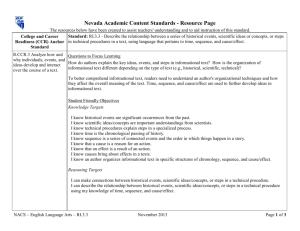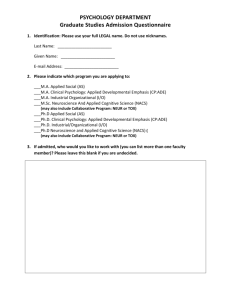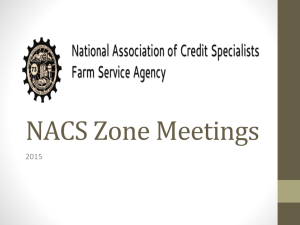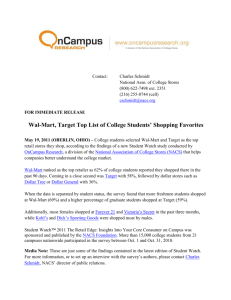Document 14300656
advertisement
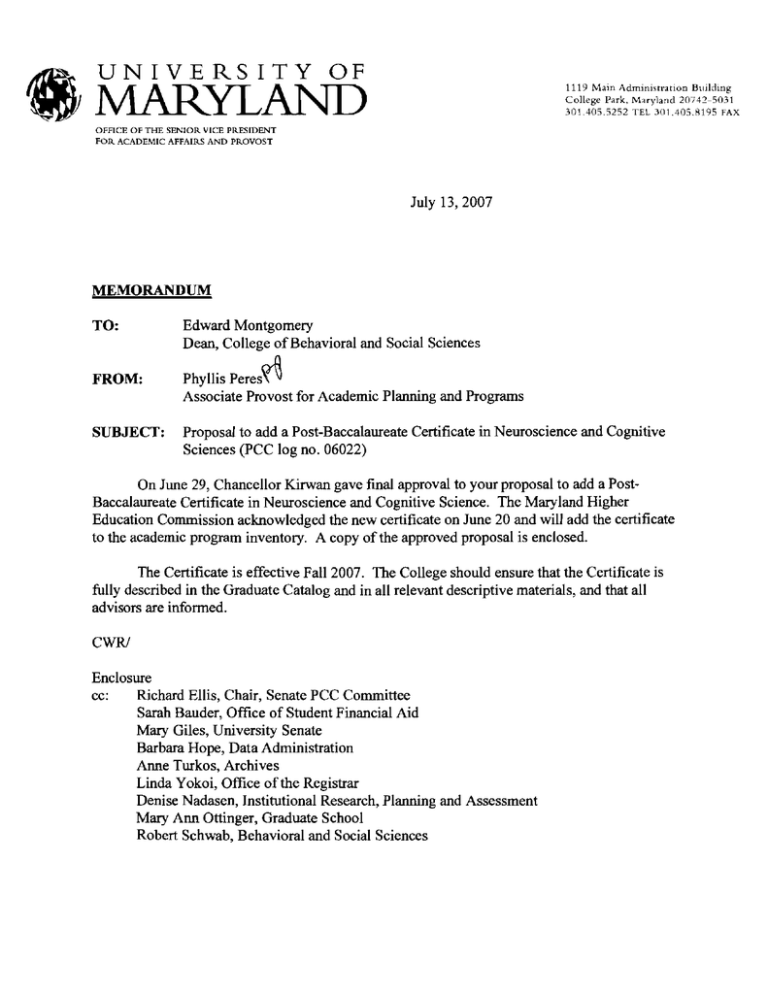
PROPOSAL FOR NEW INSTRUCTIONAL PROGRAM UNIVERSITY OF MARYLAND AT COLLEGE PARK, MARYLAND Post-Baccalaureate Certificate in Neurosciences and Cognitive Science COLLEGE OF BEHAVIORAL AND SOCIAL SCIENCES DEAN EDWARD MONTGOMERY Post-Baccalaureate Certificate in Neuroscience and Cognitive Science August 2007 Award to Be Offered Proposed initiation Date 1 I. OVERVIEW and RATIONALE A. The study of brain function has undergone an explosive increase. There is no doubt that neuroscience and cognitive science will contribute to the great research discoveries of this century. In the University System of Maryland (USM), the establishment of an inter-campus Neuroscience and Cognitive Science (NACS) Graduate Program in 1995 was a milestone of recognition. That program now hosts 40 graduate students across 8 departments and has graduated its first 12 PhD students. Five graduate core courses have been set up to train its students. NACS is, by its nature, an interdisciplinary study and it is a study that is often reached at a late stage in an educational career. This is rightly so, since the best research in neuroscience and cognitive science is often achieved by those who have formal training in another discipline, such as engineering, linguistics or psychology and who discover neuroscience or the cognitive sciences during their graduate career. This career path is particularly important for students from minority institutions or from small colleges, where undergraduate neuroscience courses may not be offered. But the discovery of NACS at this stage poses a problem for these students. Should they abandon their home departments and switch to NACS in order to graduate with an expertise in neuroscience or the cognitive sciences? The NACS Program does not wish to transfer these students who have entered other departments. Rather we would prefer to offer a Post-Baccalaureate (Graduate) Certificate in Neuroscience and Cognitive Science to those students in other Graduate programs who would like to display knowledge of neuroscience on their transcript. The Certificate will help our departmental graduate programs be more competitive against universities such as MIT and Rutgers which already offer certificates or formally acknowledge extra NACS-related coursework on student transcripts. We anticipate a continued demand for PhD graduates to enter fields that involve neuroscience and cognitive science. Our aim is to enhance the competitiveness of our graduating students in obtaining these post-doctoral, biotech and policy positions by certifying their training in the understanding of brain function. We further expect that the NACS Certificate will enhance recruitment into current graduate programs by offering students and advisors more flexibility. One may well ask why a Psychology or Linguistics PhD would want such a certificate – does not a psychology or linguistics degree guarantee knowledge of neuroscience and cognitive science? In fact, the broad nature of interdisciplinary neuroscience means that students in those areas do not necessarily cover electrophysiology, brain imaging, or molecular neuroscience, for example. In addition there are disciplines such as linguistics and computer science where career success may in the future hinge on an understanding of brain function but where current coursework expectations contain no required neuroscience. 2 We propose that students taking the Certificate will study a subset of the five NACS core courses, will enroll in the NACS seminar course (thereby fostering increased interaction with full-time NACS students) and will take at least 3 additional credits from a list of approved courses. B. When the certificate program is mature, after about 5 years of operation, we anticipate at most 25 - 40 students within the program at any one time, with 5-8 entering the program each year. We anticipate that the majority of these students will be enrolled in PhD degree programs including but not limited to Psychology, Kinesiology, Linguistics, Electrical Engineering and Computer Science. II. CURRICULUM A. Catalog Description. The Program in Neuroscience and Cognitive Science (NACS) at the University of Maryland offers interdisciplinary research and training within neuroscience, computational neuroscience, and cognitive science. NACS is a community of scholars combining approaches from a wide range of disciplines to ask fundamental questions about the nervous system, behavior and cognition. The core of this program is the NACS PhD program. However, to facilitate interactions between NACS and its constituent disciplines, NACS offers a PostBaccalaureate Certificate for students pursuing graduate degrees in related departmental programs. This allows students to obtain significant interdisciplinary training that complements their graduate degree in a NACS-related discipline. The NACS Certificate serves to acknowledge this training. B. List the courses (number, title, semester credit hours) that would constitute the requirements and other components of the proposed program. Provide a catalog description for any courses that will be newly developed or substantially modified for the program. Students must complete a minimum of 16 credits through completing the following courses with a grade of B (3.0) or better in each class. 1. Students must complete a core of 10 credits, comprising: a) At least two of the courses within the NACS core curriculum. Currently, the NACS core curriculum consists of the following five courses: NACS 641 Introduction to Neurosciences (4 credits) NACS 642 Cognitive and Computational Neuroscience; (4 credits) 3 NACS 643 Computational Neuroscience (4 credits) NACS 644 Cellular and Molecular Neuroscience (4 credits) NACS 645 Introduction to Cognitive Science (4 credits) b) Two semesters of NACS 608, Neuroscience and Cognitive Science Seminar, one credit per semester. This course requires attendance at the weekly NACS Colloquium. 2. Students must also complete at least 6 additional credits chosen from a list of approved graduate courses published each semester by the NACS Graduate program. Samples of course lists from recent semesters are attached. Courses taken at the 400-level require the approval of the NACS Graduate Director. Eligible courses taken prior to admission to the NACS Certificate program may count towards the certificate, with the permission of the NACS Graduate Director. C. Describe any selective admissions policy or special criteria for students selecting this field of study. Only students enrolled in a Ph. D. degree program at the University of Maryland will be eligible for the NACS Certificate. Students enrolled in the NACS PhD program are not eligible. Admission will be at the discretion of the NACS Director, with the advice and consent of the NACS Executive Committee. Students must submit a letter to the NACS Graduate Director requesting admission and outlining their plan of study for the NACS Certificate. Students must also identify a NACS faculty member to serve as their advisor. In many cases this may be the student’s existing departmental PhD advisor. Study for the Certificate must be completed by the end of the fifth year after admission to the program. III. FACULTY AND ORGANIZATION A. Who will provide academic direction and oversight for the program? The NACS Director will provide oversight and leadership, with the advice and consent of the NACS Executive Committee. B. If the program is not to be housed and administered within a single academic unit, provide details of its administrative structure. This should include at least the following: i. Participating units. The NACS program is housed administratively within the College of Behavioral and Social Sciences, although the NACS faculty are drawn from a number of colleges: 4 AGNR-Agriculture and Natural Resources CLFS-Chemical and Life Sciences CMPS-Computer, Math, and Physical Sciences ENGR-Engineering ARHU-Arts and Humanities BSOS-Behavioral and Social Sciences HHLP-Health and Human Performance ii. Academic home and reporting relationship of the program director. Professor Cynthia Moss, Dept. of Psychology, is the Director of NACS. She reports to the Dean of the College of Behavioral and Social Sciences, currently Dean Edward Montgomery. iii. Composition and authority of a faculty oversight committee. The Executive Committee of NACS consists of eight members with balanced representation from the colleges to which NACS reports. The Executive Committee advises the Director on all matters concerning the NACS program, including the graduate program, curriculum and membership. Process for appointment of this committee. The NACS Executive Committee is elected by a ballot of all NACS-affiliated faculty, following a nomination process that ensures balanced representation according to the numbers of NACS-affiliated faculty in each college. Cynthia Moss Norbert Hornstein Timothy Horiuchi Amanda Woodward David Poeppel William Hodos Colin Phillips David Yager Robert Dooling Jonathon Simon Hey-Kyoung Lee Mary Ann Ottinger Jane Clark Yiannis Aloimonos Bruce Swett Psychology (BSOS), NACS Director Linguistics (ARHU), Assoc. Director Elec & Computer Eng. (ENGR), Assoc. Director Psychology (BSOS), Graduate Director Linguistics/Biology (ARHU/CLFS) Psychology (BSOS) Linguistics (ARHU) Psychology (BSOS) Psychology (BSOS) Elec. & Computer Eng. (ENGR) Biology (CLFS) Animal & Avian Science (AGNR) Kinesiology (HHLP) Computer Science (CMPS) (student representative) 5 iv. Process for assigning faculty to needed courses, and agreements with departments for releasing faculty or for allowing faculty overload for this purpose. Source for teaching assistants, if needed. The core courses for this program are all part of the existing NACS PhD Program and are staffed under existing agreements between the NACS PhD program and the chairs of the departments where the instructors have their appointments. These courses have been continuously staffed since their inception. v. Arrangements for student advisement. For a graduate program, arrangements for research mentoring, assistantships, laboratory access, access to other resources, etc., as applicable. Students entering the Certificate Program must identify a NACS faculty member who will serve as their academic advisor, with responsibility for advising them on their plan of coursework and monitoring their academic progress. Students will meet annually with their advisor. vi. Process for recommending and proposing program changes. Process and schedule for program review. Courses available to students for credit towards the Certificate will be reviewed each semester by the NACS Curriculum Committee, the review taking place at the beginning of the semester preceding that in which the courses are offered. The Curriculum Committee is a standing committee of the NACS program which reports to the NACS Executive Committee. The Certificate Program will be reviewed at the end of the third year after its inception by the NACS Oversight Committee and every five years thereafter. IV. OFF CAMPUS PROGRAMS A. If the program is to be offered to students at an off-campus location, with instructors in classrooms and/or via distance education modalities, indicate how student access to the full range of services (including advising, financial aid, and career services) and facilities (including library and information facilities, and computer and laboratory facilities if needed) will be assured. B. If the program is to be offered mostly or completely via distance education, you must describe in detail how the concerns in Principles and Guidelines for Online Programs are to be addressed. N/A V. OTHER ISSUES A. Describe any cooperative arrangements with other institutions or organizations that will be important for the success of this program. 6 None B. Will the program require or seek accreditation? Is it intended to provide certification or licensure for its graduates? Are there academic or administrative constraints as a consequence? No VI. COMMITMENT TO DIVERSITY Identify specific actions and strategies that will be utilized to recruit and retain a diverse student body. The NACS Certificate Program is especially suited for students who completed their undergraduate degree at minority institutions or small colleges, where undergraduate neuroscience courses may not be offered. We will make every effort to work with Graduate Program Directors to advertise the Certificate Program to students entering PhD programs on campus from those institutions. VII. REQUIRED PHYSICAL RESOURCES A. Additional library and other information resources required to support the proposed program. You must include a formal evaluation by Library staff. None B. Additional facilities, facility modifications, and equipment that will be required. This is to include faculty and staff office space, laboratories, special classrooms, computers, etc. None C. Impact, if any, on the use of existing facilities and equipment. Examples are laboratories, computer labs, specially equipped classrooms, and access to computer servers. None VIII. RESOURCE NEEDS and SOURCES Describe the resources that are required to offer this program, and the source of these resources. Project this for five years. In particular: A. List new courses to be taught, and needed additional sections of existing courses. Describe the anticipated advising and administrative loads. Indicate the personnel resources (faculty, staff, and teaching assistants) that will be needed to cover all these responsibilities. 7 No new courses will be taught. We do not anticipate that demand will increase the sections required of existing courses. Faculty advisors will spend a maximum of 2 additional hours per semester advising certificate students. We do not anticipate more than 3 advisees per faculty member. The NACS faculty have voted at their Annual Meeting to share this responsibility within their current workload devoted to their participation in the NACS program. In many cases, there will be no extra advising load, since students will be advised under the Certificate Program by their existing departmental PhD advisors, if the latter are also NACS members. Administration of the program will be maintained by the existing NACS Graduate Coordinator and the Director’s Staff. B. List new faculty, staff, and teaching assistants needed for the responsibilities in A, and indicate the source of the resources for hiring them. None C. Some of these teaching, advising, and administrative duties may be covered by existing faculty and staff. Describe your expectations for this, and indicate how the current duties of these individuals will be covered, and the source of any needed resources. We do not anticipate that demand will increase the sections required of existing courses. Faculty advisors will spend a maximum of 2 hrs per semester advising certificate students. We do not anticipate more than 3 advisees per faculty member. The NACS faculty have voted at their Annual Meeting to share this responsibility within their current workload devoted to their participation in the NACS program. D. Identify the source to pay the for the required physical resources identified in Section VII. above. N/A E. List any other required resources and the anticipated source for them. F. Complete Tables 1 and 2 as required by MHEC. 8 NACS NEWSLETTER THE NEWSLETTER OF THE NEUROSCIENCE AND COGNITIVE SCIENCE PROGRAM AT THE UNIVERSITY OF MARYLAND, COLLEGE PARK SPRING 2006 EDITION TITLE: Biol 608R Molecular physiology of channels & receptors (2 credits) INSTRUCTOR: Sergi Sukharev DAY(S) AND TIME: Monday 2:00PM – 4:00 PM(1245BPS) DESCRIPTION:The seminar will be primarily focused on reading and discussing key chapters or papers on critical mechanisms of ion permeation, excitability and signal transduction by membrane receptors. PREREQUISITES (IF ANY): TEXT(S) ********** TITLE: CMSC 421 Introduction to Artificial Intelligence (3 credits) INSTRUCTOR: Nau DAY(S) AND TIME: Tuesday and Thursday 3:30PM - 4:45PM (CSI 1121) DESCRIPTION: Areas and issues in artificial intelligence, including search, inference, knowledge representation, learning, vision, natural languages, expert systems, robotics. Implementation and application of programming languages (e.g. LISP, PROLOG, SMALLTALK), programming techniques (e.g. pattern matching, discrimination networks) and control structures (e.g. agendas, data dependencies). PREREQUISITES (IF ANY): grade of C or better in CMSC330 and in CMSC351; and permission of the department or CMSC graduate student. TITLE: CMSC 726 Machine Learning (3 credits) INSTRUCTOR: L. Getoor DAY(S) AND TIME: Tuesday and Thursday 11:00 AM – 12:15AM (CSI 1121) DESCRIPTION: PREREQUISITES (IF ANY): CMSC 421 or equivalent, or the permission of the instructor ************ 1 TITLE: CMSC 828D: Algorithms and systems for capture and playback of spatial audio. INSTRUCTOR: R. Duraiswami DAY(S)/TIME: Monday and Wednesday 3:30PM – 4:45PM DESCRIPTION: Course will survey the field of audio capture, processing, and playback. A series of introductory lectures by the instructor will provide the physical, mathematical, and signal processing basis for the course. The course will then move on to a discussion of papers and systems dealing with various aspects of spatial audio. PREREQUISITES: The course will be somewhat mathematical, and student should be comfortable with or willing to work with some differential equations and do some (Matlab) programming. TITLE: CMSC 828F: Perceptual Robotics INSTRUCTORS: Cornelia Fermüller and Abjijit Ogale. DAY(S)/TIME: Monday 4:00PM – 6:45PM. DESCRIPTION: The emphasis of this class is on using a real mobile robot to accomplish several tasks using primarily visual sensors (i.e. a stereo pair of cameras), as well as secondary sensors such as infrared and audio. PREREQUISITES: For Computer Science Ph.D. students; It is not a core course, but counts for additional two required classes. For Computer Science Master’s students: The course is MSComp/MS Qualifying. TITLE: CMSC 828J: Approaches to Representing and Recognizing Objects. INSTRUCTOR: David Jacobs DAY(S)/TIME: Tuesday and Thursday 11:00AM – 12:15PM DESCRIPTION: We will study the advantages and limitations of geometric and photometric invariants. We will also consider classification approaches based on powerful similarity measures. The class will alternate between lectures teaching the basic mathematical and algorithmic techniques of various methods, and discussion of research papers that apply to the specific techniques. PREREQUISITES: It will be essential for students to have a solid understanding of basic topics in math, such as linear algebra, probability and statistics and calculus. Some knowledge of computer vision, image processing, functional analysis, stochastic processes, or geometry is useful. ************** TITLE: ENEE 434 Introduction to Neural Networks and Signals INSTRUCTOR: R. W. Newcomb DAY(S) AND TIME: Monday and Wednesday 2:00PM – 3:15PM (CHE 2136) DESCRIPTION: This course covers artificial neural networks (ANNs) as inspired by biological neural networks and suitable for vlsi realization. Different classes of ANNs will be covered as taken from the MatLab Neural Network toolbox and 2 from papers in the literature. Emphasis will be placed upon their algorithms, design, vlsi realizations, and roles in neurocomputing. PREREQUISITES (IF ANY): ENEE 204 and completion of all lower-division technical courses in the EE curriculum. ENEE majors only. TEXT(S): Matlab Neural Network Toolbox Manual and journal articles ************ TITLE: HESP 400 Speech and Language Development in Children (3 credits) INSTRUCTOR: Rochelle Newman DAY (S) AND TIME: Tuesday and Thursday 11:00AM – 12:15PM (LEF 2208) DESCRIPTION: This course focuses primarily on the acquisition of (first) language by typically-developing children, particularly how children progress from early perceptual skills and prelinguistic vocalization to the level at which they produce and understand complex sentences. PREREQUISITES: HESP 300 with a grade of “C” or better, or permission of department. Recommended HESP 120 or LING 200. TEXT (S): TITLE: HESP 402 Speech Pathology I (3 credits) INSTRUCTOR: Froma P. Roth DAY (S) AND TIME: Tuesday and Thursday 12:30PM – 1:45PM (TYD 0117) DESCRIPTION: Etiology, assessment, and treatment of language and phonological disorders in children PREREQUISITES: HESP 400 with a grade of “C” or better, or permission of the department. TEXT (S): Kuder (2003). Teaching Students with Language and Communication Disablilities TITLE: HESP 602, Neurological Bases of Human Communication (3 credits) (Also offered as HESP 422 and NACS 728K) INSTRUCTOR: Yasmeen Faroqi Shah DAY(S) AND TIME: Monday 1:00PM – 3:30PM (LEF 1222) DESCRIPTION: This course introduces the neurobiological bases of human communication, in particular, of higher cognitive functions, such as, language and speech, memory and attention, motor and executive, emotional control, and of visual and auditory perception. Each of these functions will be discussed from a cognitive psychology perspective and broken down into its respective cognitive components. The central question that will be addressed is what parts of the brain support each cognitive component and how does brain damage impair its functioning in neuropsychological and neuropsychiatric patient populations. To promote a better understanding of these topics, the course will start with an introduction of the neuroanatomy of the central nervous system as well as the 3 neurophysiological properties of nerve cells. In addition, the course will provide an overview of the methods used in the field, including functional neuroimaging methods (PET, fMRI), electrical recording and stimuluation techniques (ERP, MEG, TMS, Brain mapping), and behavioral methods (dichotic listening, visualhalf field presentation, split-brain experiment, the double dissociation logic used in patient studies). Course requirements include 2 exams with short-answer questions and a term paper, including a research proposal presented in class. PREREQUISITES (IF ANY): permission of department TITLE: HESP 626, Language and Learning Disabilities (3 credits) (Also offered as NACS 728M) INSTRUCTOR: Froma P. Roth DAY(S) AND TIME: Monday 9:30AM – 12noon (LEF 0135) DESCRIPTION: Advanced graduate seminar on language and literacy disabilities of school-aged children and adolescents, with an emphasis on the relationship between oral language and literacy. Contemporary assessment and intervention issues are explored. PREREQUISITES: Permission of department TEXT (S): Series of required readings from the literature TITLE: HESP724: Research design. INSTRUCTOR: Rochelle Newman DAY(S) AND TIME:Mondays, 1 - 3:30PM (LEF0135) DESCRIPTION: The class discusses the basic elements in the design of empirical, behavioral research studies, and how to evaluate the research of others. A major portion of the class will be devoted to detecting potential flaws in others' research. PREREQUISITES: TEXT (S): ************** TITLE: LING 641 Issues of Psycholinguistics (3 credits) INSTRUCTOR: Colin Phillips/Jeff Lidz DAY(S) AND TIME: Monday and Wednesday 1:30PM- 3:00PM (JMZ 3118) DESCRIPTION: Topics of current interest in psycholinguistics, including both theoretical approaches and experimental and analytical issues in language acquisition, language processing, and neurolinguistics. PREREQUISITES (IF ANY): LING 640 TEXT(S): TITLE: LING 646 Cognitive Neuroscience of Language(3 credits) INSTRUCTOR: David Poeppel DAY(S) AND TIME: Wednesday 9:30AM- 12:30PM (ARM 0108) 4 DESCRIPTION: Overview of classical and recent work on the neural basis of speech and language, with a goal of introducing contemporary methods and results to prepare the student to read the neurolinguistics and cognitive neuroscience literature. An emphasis will be placed on current techniques. PREREQUISITES (IF ANY): permission of instructor TEXT(S): TITLE: LING 647 Computational Linguistics II (3 credits) INSTRUCTOR:Philip Resnik DAY(S) AND TIME:Wednesdays 4:00PM – 6:30PM (CSI 2107) DESCRIPTION: Natural language processing with a focus on corpus-based statisticaltechniques. Topics include: stochastic language modeling, smoothing, noisy channel models, probabilistic grammars and parsing; lexical acquisition, similarity-based methods, word sense disambiguation, statistical methods in NLP applications; system evaluation. PREREQUISITES (IF ANY): LING 645 or permission of instructor. Further exploration of statistical and symbolic techniques in computational linguistics. TEXT(S): TITLE: LING 849 Seminar in Psycholinguistics (3 credits) INSTRUCTOR: Jeff Lidz DAY(S) AND TIME: Tuesday 3:00PM-6:00PM (ARM 0108) DESCRIPTION: PREREQUISITES (IF ANY): TEXT(S): ************** TITLE: NACS 728F/BIOL 600 Ethics in Scientific Research (2 credits) INSTRUCTOR: Arthur N. Popper DAY(S) AND TIME: Wednesday 3:00 P.M. – 5:00 P.M.(BPS 2249) DESCRIPTION: Required of all NACS students and fulfills requirements for NRSA training awards for a class in scientific ethics. This class is a discussion and seminar of important topics dealing with how to do scientific research. Topics include mentoring, data ownership, animal and human subjects, peer review, publication , inventions and patents, etc. PREREQUISITES (IF ANY): At least one year of doctoral studies. Permission of instructors required. NOTE, this course is required for ALL NACS students and students on NIH funds (NRSA awards). Space is reserved for NACS, Biology, Psychology, and NRSA students until November 30, 2005, after which time it will be opened to other students. If you need to take this course please register early. 5 TITLE: NACS 642 Cognitive Neuroscience(4 credits) INSTRUCTOR: David Poeppel DAY(S) AND TIME: MW 1:00 P.M.-3:00P.M DESCRIPTION: A study of the fundamental concepts and techniques of cognitive and computation nueroscience. Recurring themes in the field such as face recognition, learning, and language are examined. PREREQUISITES (IF ANY): 641 or permission of instructor TEXT(S): ROOM:1108B Marie Mount Hall TITLE: NACS 643 Computational Neuroscience (4 credits) INSTRUCTOR: Todd Troyer DAY(S) AND TIME: MW 10:00 A.M.-11:50A.M. DESCRIPTION:. Credit will be granted for only one of the following: NACS643 or NACS728N. Formerly NACS 728N. Provides a mathematical foundation in computational neuroscience. PREREQUISITES (IF ANY): 641, Calculus or permission of instructor TEXT(S): Churchland and Sejnowski, (1992) The Computational Brain ROOM:PLS 1117 TITLE: NACS 644 Cellular and Molecular Neuroscience (4 credits) INSTRUCTOR: Elizabeth Quinlan DAY(S) AND TIME: TuTh 3:30 P.M. – 5:00 P.M., Wed 3:00P.M. – 4:00 P.M. DESCRIPTION: This course will provide an overview of recent insights into the molecular mechanisms underlying the structure and function of the nervous system, focusing on 3 overlapping themes: the molecular machinery subserving neuronal function, intracellular signaling cascades initiated by synaptic activation, and synaptic plasticity. In addition we will examine the techniques employed to gain these insights, including optical imaging, biochemistry, cell biology, genetics and proteomics. Weekly discussion sections will be used to critically review original literature. PREREQUISITE: NACS 641 or permission of instructor. Credit will be granted for only one of the following: NACS 644 or NACS 728Z. TEXT(S): To be decided. ROOM:1113 PLS and 1180 PLS for discussion ************ TITLE: PSYC 401 Biological Bases of Behavior Laboratory (4 credits) INSTRUCTOR: David Yager DAY(S) AND TIME: Monday and Wednesday 9:00AM-10:50AM (BPS 1236) Lab: Monday 1:00 PM – 5:00PM (BPS 4120) DESCRIPTION (ONE HALF PAGE MAXIMUM): PSYC 401 explores the anatomical and physiological systems that underlie animal behavior using current neuroanatomical and neurophysiological techniques. The semester will be 6 divided into several 3-4 week modules. In the first week, students will study and quantify a simple behavior such as prey capture or sound localization. In the remainder of the module, they will identify the groups of nerve cells involved in the behavior and study the neurophysiological responses that lead to the behavior. An emphasis will be on demonstrating some of the more important principles of biopsychology including feature detection, central pattern generators, and neuromodulation. Techniques used will include microsurgery, extracellular nerve recording (several techniques), staining of individual nerve cells, multiunit CNS recording, computerized data acquisition and analysis, and collection of simple behavioral data (several techniques), and neuropharmacology. Subjects for the experiments will be fish, frogs, and invertebrates; no warm-blooded animals will be used. PREREQUISITES (IF ANY):. BIOL 105 (majors intro biology), PSYC 200 Statistics, PSYC 301 Biological Basis of Behavior or equivalent; permission of department required. Restrict to PSYC majors who have completed 85 credits. Also offered as NACS 728Q. TEXT(S): Course lab manual plus primary literature TEXT(S): Mayer, R. E. (1992). Thinking, problem solving, cognition (2nd ed). New York: W. H. Freeman. TITLE: PSYC498/PSYC679A Advanced Psychology: Seminar in Cognitive Development INSTRUCTOR: Amanda Woodward DAY(S) AND TIME: Tuesdays 2-4:30PM DESCRIPTION: PREREQUISITES (IF ANY): TEXT(S): Room: 1112 BPS TITLE: PSYC 779 Seminar in Human Performance Theory and Human Computer Interaction (3 credits) Grading method REG INSTRUCTOR: K. L. Norman DAY(S) AND TIME: M 1:30 - 4:00 BPS 1203 DESCRIPTION: This course reviews the cognitive issues relevant in the design and use of automated systems. Cognitive issues include perception, attention, motivation, memory, reasoning, judgment and decision making. Automated systems range from hand held devices to global command and control systems. The emphasis in this course is on the cognitive processes, human factors, and psychological issues that interface with and mediate the systems. PREREQUISITES (IF ANY) TEXT(S): Online course materials and texts at http://cognitron.umd.edu 7 ASSESSMENT PLAN CERTIFICATE PROGRAM IN NEUROSCIENCES AND COGNITIVE SCIENCES (Program of Study / Major / Degree Level, etc.) Program Contact: Cynthia Moss Phone: ext. 5-6905 E-mail: cmoss@psyc.umd.edu Date submitted to Academic Unit Head: Program Goals: The NACS Graduate Certificate program provides graduate students enrolled in other campus graduate programs the opportunity to obtain recognition for advanced course work in the neurosciences and cognitive sciences. This coursework is a selection of the courses offered by the Neurosciences and Cognitive Science (NACS) Program. Our aim is to enhance the competitiveness of graduating students in obtaining post-doctoral, biotech and policy positions by certifying their training in the understanding of brain function. Relevance of goals to the mission statements and/or strategic plans of the University, College, or Program as applicable: The Learning Outcomes listed below are in keeping with the mission of the Neurosciences and Cognitive Sciences (NACS) Graduate Program. The mission of the NACS Program…….. Student Learning Outcomes Assessment Measures and Criteria Assessment Schedule (list the three-to-five most important) (describe one or more measures for each outcome and criteria for success) (initial year, and subsequent cycle) 1. Students will develop an intellectual foundation and appreciation for the current state of the core of knowledge in the neurosciences and cognitive sciences through formal coursework. 90% of entering Certificate Students will complete at least two of the courses within the NACS core curriculum with a grade of B or better. Currently, the NACS core curriculum consists of the following five courses: All students must meet annually with an academic advisor chosen from the NACS faculty, who will advise them on their plan of coursework and monitor their academic progress. From these annual meetings, records of students passing NACS core courses will compiled. NACS 641 Introduction to Neurosciences (4 credits) NACS 642 Cognitive and Computational Neuroscience; (4 credits) NACS 643 Computational Neuroscience (4 credits) NACS 644 Cellular and Molecular Neuroscience (4 credits) NACS 645 Introduction to Cognitive Science; (4 credits) 2. Students will develop a more detailed and specialized knowledge of the application of knowledge in the neurosciences and cognitive sciences to their Ph. D studies. 80% of Certificate Students will complete at least six additional credits chosen from a list of courses published each semester by the NACS Graduate program, with grades of B or better.. All students must meet annually with an academic advisor chosen from the NACS faculty, who will advise them on their plan of coursework and monitor their academic progress. From these annual meetings, records of students passing NACS core courses will compiled. 3. Students will become conversant with the latest results and controversies within the field of neurosciences and cognitive science. Students will take two semesters of NACS 608, requiring attendance at the weekly NACS research seminar. The students will, at their annual meeting with their academic advisor, display adequate knowledge of seminars presented in the previous academic year and be able to critique their content. Advisors will be required to assess and document this knowledge at the annual meeting. ASSESSMENT RESULTS BIOLOGY (BIOL) GRADUATE PROGRAM, M.S. (THESIS) (Program of Study / Major / Degree Level, etc.) For Time Period: Program Contact: Phone: ext. E-mail: Date submitted to Academic Unit Head: Student Learning Outcomes (list only those assessed during this time period) 1. 2. Assessment Criteria and Results Impact of Results 3. 4. 5.

